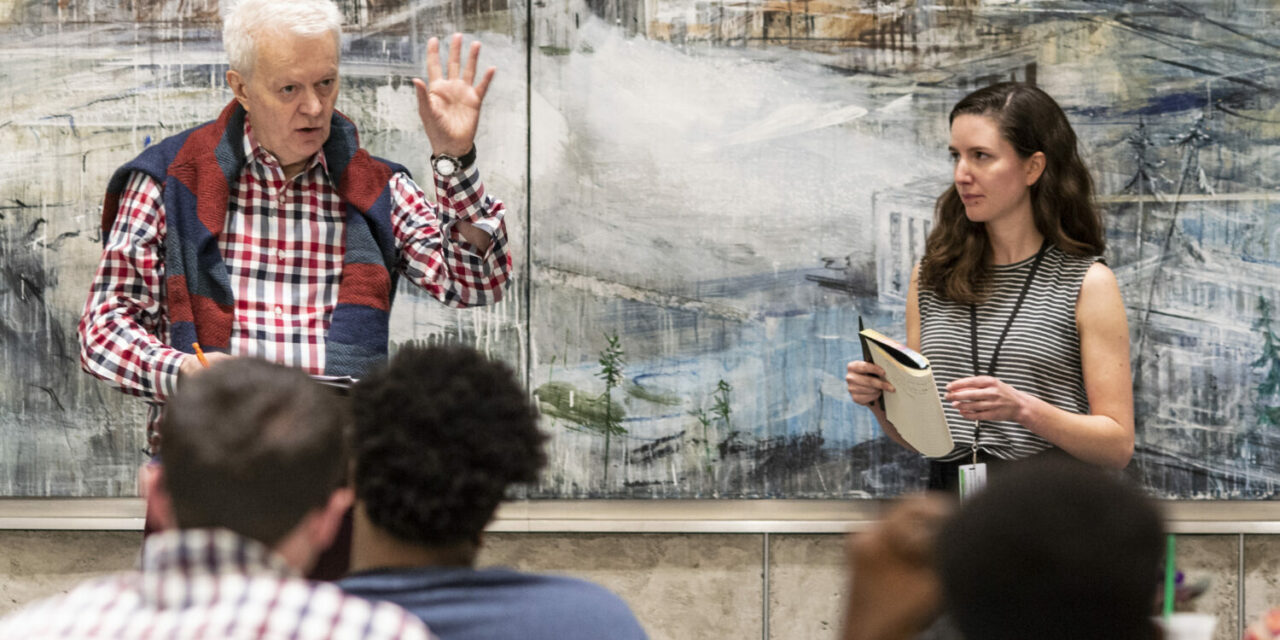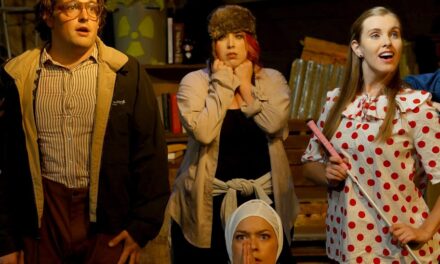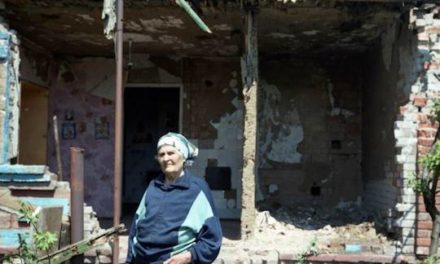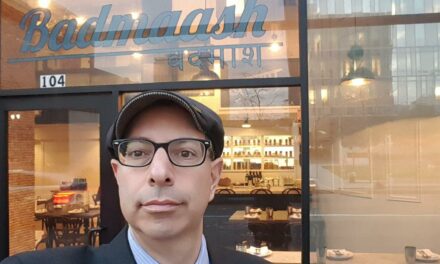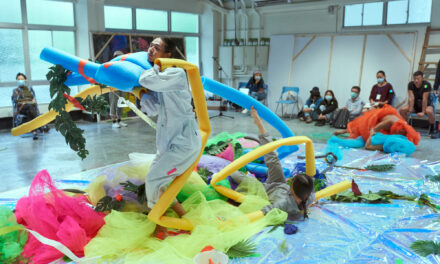Students and early career dramaturgs were invited to The John F. Kennedy Center for Performing Arts in Washington DC from 27th July to 4th August 2019 to participate in the 8th New Play Dramaturgy Intensive. This masterclass, led by dramaturg Mark Bly, was created in 2011 through a partnership between the Kennedy Center, the Literary Managers and Dramaturgs of the Americas (LMDA) and the National New Play Network (NNPN). The goal of this annual Dramaturgy Intensive is to provide new and emerging dramaturgs with a firsthand opportunity to learn how to be a key resource in the rehearsal room to both the playwright and the director. During the eight days of the Intensive, participants were invited to witness a series of workshops developing new plays, as well as participate in discussions with eminent American dramaturgs.
The core aspect of the Intensive revolves around the plays in development. This year there were eight plays being workshopped, and the end of the program culminated in staged readings of these texts. The plays were selected through another program, The MFA Playwrights’ Workshop. This workshop was founded in 2006 and invites each year up to eight MFA student playwrights from seventy participating universities to come to the Kennedy Center and see their plays developed by a team of professionals. The Dramaturgy Intensive now runs adjacent to this program.
Participants in the Dramaturgy Intensive this year were allocated to one of the eight plays that aligned with their personal interests, previous research, and experience. They were under the care of a mentor dramaturg and acted as this mentor’s assistant dramaturgs.
Each play was unique, but overall themes of religion, race, identity, and heritage prevailed throughout. The plays were at various stages of completion. While some playwrights brought a near-finished play, others arrived with only research and no script. This inevitably made the work in every rehearsal room very different, and the dramaturgy of each room varied extensively.
The teams in every rehearsal room were composed of a number of professionals. In addition to the mentor dramaturg, the assistant dramaturgs, and the playwright, there were also a host of actors invited to bring the text to life, a director, an assistant director, and a stage manager. The playwrights also had the possibility to request further professionals if necessary. Accordingly, one rehearsal room invited a movement director and another had a sound designer present. This setting allowed assistant dramaturgs to not only benefit from the presence of a more experienced mentor dramaturg but also witness, in some cases for the first time, the inner mechanics of a professional rehearsal room.
I was assigned to Charly Evon Simpson’s new play, Sandblasted. The director was Summer L. Williams, and the lead dramaturg was Jacqueline E. Lawton. There were two other assistant dramaturgs in this rehearsal room.
The most exciting aspect of the rehearsal process for me was to witness the script development. Before the intensive began, I was sent a first draft, which was 45 pages long. Throughout the five days of the developmental process, I saw the script grow from 45 pages to 120 pages. This came about in response to the rehearsal room discussions that highlighted key points in the world of the play that could be developed.
For example, the first draft had three male characters: the protagonist’s brother, a bartender, and an ex-boyfriend. During the working process, the playwright discovered that the brother was in fact also the bartender. This added an extra dimension, not only to the character but also to the world of the play, which showed how the lives of all the people in the play interwove one with another.
While the assistant dramaturgs’ involvement in the rehearsal rooms was different, my experience (and that of the two other assistant dramaturgs) in this particular rehearsal room was mostly one of observation. We were asked only a couple of times to voice our thoughts in the rehearsal room. Mostly, we communicated directly with our mentor dramaturg, Jacqueline, outside the rehearsal room via email. Each assistant dramaturg was asked to provide a list of questions (or comments) about the play, its characters, and the world the play was set in. These questions were then related back to the playwright through Jacqueline. We were also able to ask questions or simply discuss dramaturgy with Jacqueline.
The final two days of the Intensive saw all the practitioners come together to watch staged readings of the plays we had been working to develop. Most plays were presented at nearly fully completed versions of the text and we were only asked to witness the readings. There were short discussions after two plays only, Oh to Be Pure Again by Kira Rockwell and Untitled TMT Play by Susan Stanton.
In addition to the work in the rehearsal room, every day we participated in discussions (led by Mark Bly) with invited dramaturgs, such as Gavin Witt, Lauren Halvorsen, Deanie Vallone, Adrien-Alice Hansel, Jacqueline E. Lawton, and Annalisa Dias.
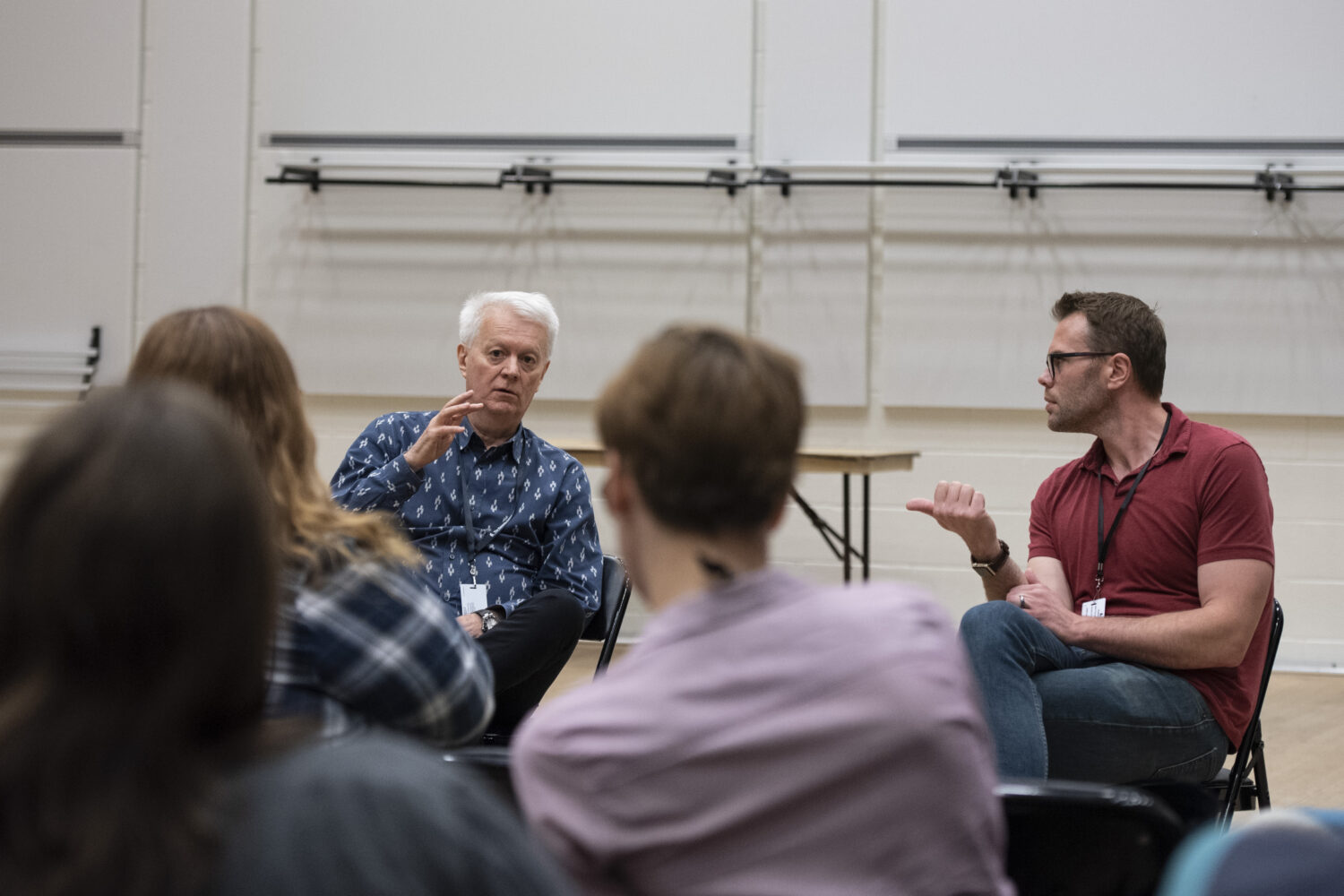
Photo by Teresa Castracene.
Gavin Witt, associate director, and dramaturg at Baltimore Center Stage was also a mentor dramaturg on one of the plays in development (Miku and The Gods by Julia Izumi). He balanced the conversation between sharing his own experience working in theatre, cultivating a career as a dramaturg, and answering any question the participants were keen to ask.
Jacqueline Lawton, who works as a freelance dramaturg and playwright, focused her discussion on dramaturgical identity in a rehearsal room. She discussed questions of race and identity within a rehearsal room, how to navigate these questions, and how each dramaturg brings their own experience into the room, which is valid in and of itself.
Annalisa Dias conducted a decolonizing workshop. This workshop looked at how theatre practitioners can refocus their practice to be more mindful of addressing communities at their roots. It also raised questions about problematic structures within theatres that exclude certain people or heritage. This was illuminating to me because I had not realized before that we can be potentially at risk of participating in these problematic structures or perpetuating pre-existing structures without even realizing it.
Finally, discussions with Mark Bly allowed us to gain an understanding of his rich experience as a dramaturg. He also talked about what to expect working in the field, and emphasized, how important it is to observe a rehearsal room, to listen, and to ask more questions than give answers.
The combination of these talks with the experience of workshopping plays in development was of value to me as an early career dramaturg. I found useful not only the talks and discovering more of the rehearsal process, but also valued the ability to meet other dramaturgs at various stages of their careers.
The Intensive did not, however, allow every assistant dramaturg the same opportunity to develop their skills. Other assistant dramaturgs in other rehearsal rooms were active participants in the dramaturgy of their assigned projects. Yet, I found that in my rehearsal room, the assistant dramaturgs were somewhat silenced, as our role was to listen and observe only. This left me feeling a bit frustrated as my experience became one purely of observation, where I was able to learn but not contribute actively to the overall project. Perhaps there is space in the Intensive’s future versions to achieve a better balance between the passivity of witnessing the work and an active participation in the rehearsal space.
The Dramaturgy Intensive had a steep learning curve for all of us, but it was especially intensive for an international participant, such as myself, a Swiss national based in London. I quickly had to assimilate American culture and reference points both in the plays presented as well as during rehearsals. Yet, the overall experience was invaluable as it allowed emerging dramaturgs the chance to experience the rehearsal process in one of the top American institutions as well as learn from leading practitioners in the United States.

Photo by Jackie Mass.
Elizabeth Leemann works as a dramaturg, playwright and assistant director for a number of theatre companies and cinema production companies in and around London, including KDC Theatre, Vulpine, Persever Productions, flashpoint collective, and The Weaver Productions in York. Elizabeth enjoys all aspects of making theatre but is primarily focused on text analysis and bringing a text to life on stage. This interest led her to obtain an MA in Text & Performance at the Royal Academy of Dramatic Art and Birkbeck, the University of London in 2017. Currently, she is expanding her work as a dramaturg in the UK and in the US, which led her to participate in the 2019 Dramaturgy Intensive at the Kennedy Center for Performing Arts.
This post was written by the author in their personal capacity.The opinions expressed in this article are the author’s own and do not reflect the view of The Theatre Times, their staff or collaborators.
This post was written by Elizabeth Leemann.
The views expressed here belong to the author and do not necessarily reflect our views and opinions.

